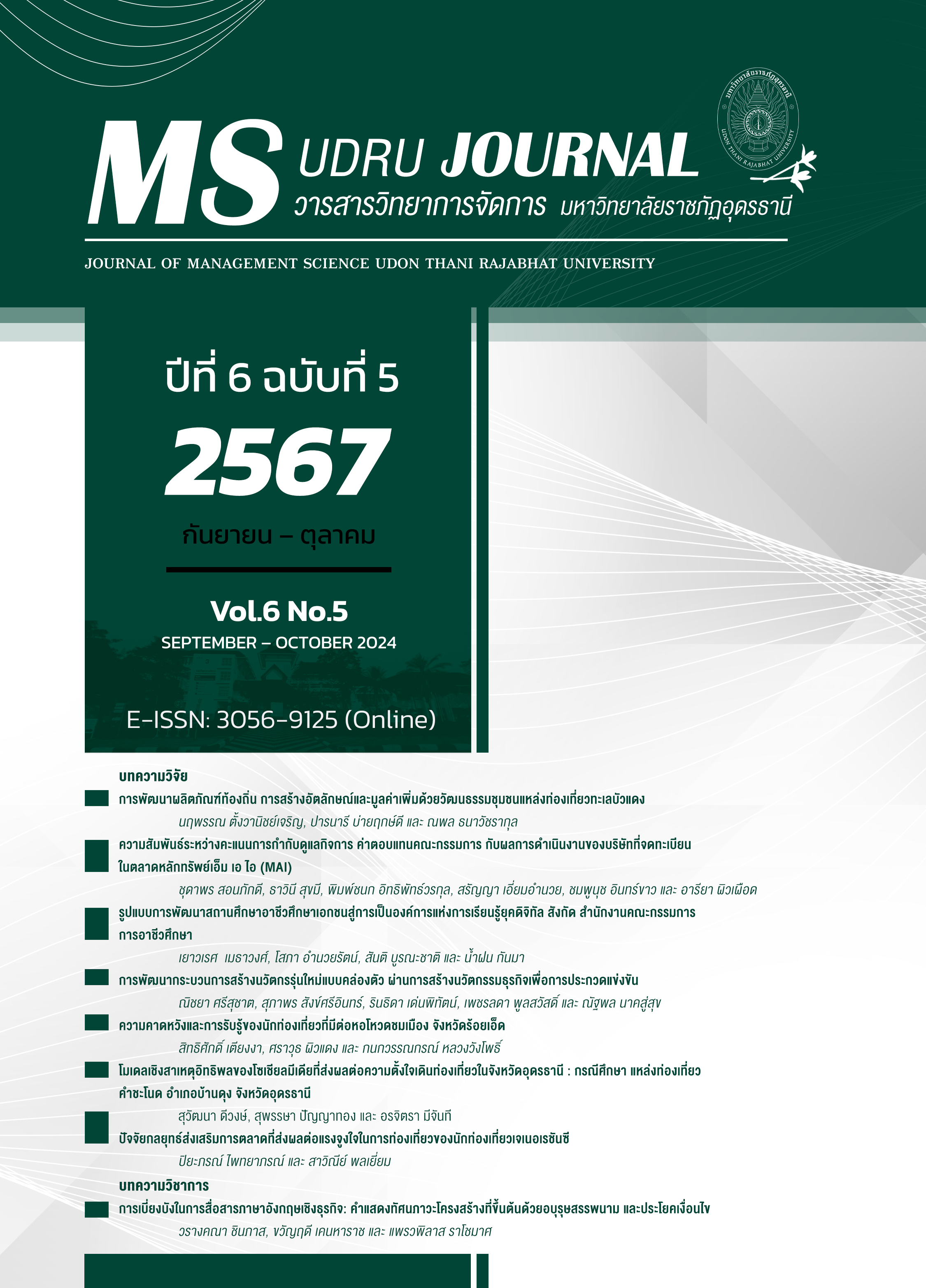การพัฒนากระบวนการสร้างนวัตกรรุ่นใหม่แบบคล่องตัว ผ่านการสร้างนวัตกรรมธุรกิจเพื่อการประกวดแข่งขัน
Main Article Content
บทคัดย่อ
การวิจัยครั้งนี้มีวัตถุประสงค์เพื่อ 1) ศึกษาข้อคิดเห็นของผู้เรียนทั้งก่อนและหลังการใช้กระบวนการสร้างนวัตกรรุ่นใหม่แบบคล่องตัวผ่านการสร้างนวัตกรรมธุรกิจเพื่อการประกวดแข่งขัน 2) พัฒนากระบวนการสร้างนวัตกรรุ่นใหม่แบบคล่องตัวผ่านการสร้างนวัตกรรมธุรกิจเพื่อการประกวดแข่งขัน โดยใช้การวิจัยเชิงคุณภาพ โดยเก็บรวบรวมข้อมูลจากการสัมภาษณ์กลุ่มจากกลุ่มผู้ให้ข้อมูลสำคัญซึ่งเป็นนักศึกษาระดับปริญญาตรี จำนวน 10 คนชุดเดิมทั้งก่อนและหลัง ดำเนินการวิเคราะห์จัดทำเป็นข้อสรุปในประเด็นสำคัญเพื่อนำไปบูรณาการกับแนวคิดและทฤษฎีที่เกี่ยวข้องเพื่อให้ได้มาซึ่งกระบวนการสร้างนวัตกรรุ่นใหม่แบบคล่องตัวผ่านการสร้างนวัตกรรมธุรกิจเพื่อการประกวดแข่งขัน
ผลการวิจัยพบว่า กระบวนการที่พัฒนาขึ้นทำให้ผู้เรียนมีข้อคิดเห็นที่ดีขึ้นจากเดิมในแง่แรงจูงใจ ความคาดหวังและความต้องการ ปัญหาเดิมได้รับการแก้ไข สภาพแวดล้อมการเรียน และทัศนคติซึ่งเป็นไปในทิศทางเดียวกันกับผลลัพธ์เชิงบวกสำหรับการประกวดแข่งขันอีกด้วย นอกจากนี้ผลการวิจัยยังสามารถนำไปประยุกต์ใช้ในการจัดการเรียนการสอนเพื่อเพิ่มทักษะความเป็นนวัตกรให้แก่ผู้เรียนอย่างมีประสิทธิผล
Article Details

อนุญาตภายใต้เงื่อนไข Creative Commons Attribution-NonCommercial-NoDerivatives 4.0 International License.
บทความที่ได้รับการตีพิมพ์เป็นลิขสิทธิ์ของคณะวิทยาการจัดการ มหาวิทยาลัยราชภัฏอุดรธานี
ข้อความที่ปรากฏในบทความแต่ละเรื่องในวารสารวิชาการเล่มนี้
ไม่ใช่ความคิดเห็นและความรับผิดชอบของผู้จัดทำ บรรณาธิการ กองบรรณาธิการ และคณะวิทยาการจัดการ มหาวิทยาลัยราชภัฏอุดรธานี ความรับผิดชอบด้านเนื้อหาและการตรวจร่างบทความแต่ละเรื่องเป็นความคิดเห็นของผู้เขียนบทความแต่ละท่าน
เอกสารอ้างอิง
จิราวัฒน์ นางาม และอิศรา ก้านจักร. (2560). ความคิดเห็นของผู้เรียนที่มีต่อระบบจัดการสิ่งแวดล้อมการเรียนรู้สำหรับห้องเรียนกลับทางเพื่อส่งเสริมการย้ายโยงการเรียนรู้ในชั้นเรียนคอมพิวเตอร์. วารสารศึกษาศาสตร์ ฉบับวิจัยบัณฑิตศึกษา มหาวิทยาลัยขอนแก่น, 11(2), 59-70.
ชลิตารัตน์ คิดถูก, เนตรชนก จันทร์สว่าง และสมสงวน ปัสสาโก. (2565). การศึกษาการรับรู้ความสามารถตนเอง และแรงจูงใจในการเรียนของนักเรียนชั้นมัธยมศึกษาปีที่ 5 โดยใช้การจัดการเรียนรู้โครงงานเป็นฐาน. วารสารมหาวิทยาลัยราชภัฏมหาสารคาม, 16(3), 236-245.
ไทยพับลิก้า. (2560). การเรียนรู้ยุคใหม่ในมุมมอง “เจ้าสัว” “ออกนอกห้องเรียน” ให้มากขึ้น. https://thaipublica.org/2017/10/thaipublica-advertorial-ep08/.
ไทยรัฐ. (2566). นวัตกรรุ่นใหม่. https://www.thairath.co.th/money/business_marketing/corporates/2697669).
ไทยรัฐ. (2566). เปิดงบวิจัยและพัฒนา 10 บริษัทยักษ์ใหญ่ของโลก ใช้เงินลงทุนกันไปเท่าไรบ้าง?. https://www.thairath.co.th/money/tech_innovation/digital_transformation/2733790.
ธนภณ พันธเสน และสุภาพร แก้วกอ เลี่ยวไพโรจน์. (2566). ความพร้อมของนวัตกรรุ่นใหม่: กรณีศึกษาการพัฒนาย่านนวัตกรรมศรีราชา. วารสารวิชาการคณะสถาปัตยกรรมศาสตร์ สจล, 36(2), 128-146.
ประไพพิมพ์ สุธีวสินนนท์ และประสพชัย พสุนนท์. (2559). กลยุทธ์การเลือกตัวอย่างสำหรับการวิจัยเชิงคุณภาพ. วารสารปาริชาต มหาวิทยาลัยทักษิณ, 29(2), 31-48.
ศุภฤกษ์ เวศยาสิรินทร์, ศราณี เวศยาสิรินทร์, จุฬารัตน์ จุลภักดิ์, ศิริวรรณ ลักษณะวงศ์ และวนภรณ์ จักรมานนท์. (2563). ถอดบทเรียนการจัดการเรียนรู้ด้วยการประกวดแข่งขันเป็นฐาน: กรณีศึกษาการผลิตสารคดีเชิงข่าวส่งประกวดรางวัลสายฟ้าน้อย. วารสารมนุษยศาสตร์และสังคมศาสตร์ มหาวิทยาลัยราชภัฏสงขลา, 2(2), 1-28.
สงวน คำรศ. (2551). ความคิดเห็นของประชาชนที่มีต่อการบริหารจัดการตามหลักธรรมาภิบาลของเทศบาลตำบลท่าวังผา อำเภอท่าวังผา จังหวัดน่าน. วิทยานิพนธ์รัฐประศาสนศาสตร์มหาบัณฑิต สาขาการบริหารและพัฒนาประชาคมเมืองและชนบท, มหาวิทยาลัยราชภัฏอุตรดิตถ์.
สำนักงานนวัตกรรมแห่งชาติ. (2566). STEAM4INNOVATOR. https://moocs.nia.or.th/article/steam4innovator.
สำนักงานสภาพัฒนาการเศรษฐกิจและสังคมแห่งชาติ. (2566). พลิกโฉมประเทศไทยสู่เศรษฐกิจสร้างคุณค่าสังคมเดินหน้าอย่างยั่งยืน. https://shorturl.asia/zon4x.
สำนักงานสภาพัฒนาการเศรษฐกิจและสังคมแห่งชาติ. (2566). ร่างแผนพัฒนาเศรษฐกิจและสังคมแห่งชาติ ฉบับที่สิบสาม พ.ศ. 2566-2570. https://www.nesdc.go.th/download/Plan13/Doc/Plan13_DraftFinal.pdf.
สุพัตรา สุภาพ. (2542). สังคมและวัฒนธรรมไทย ค่านิยม ครอบครัว ศาสนา ประเพณี (พิมพ์ครั้งที่ 10). กรุงเทพฯ: วัฒนาพานิช.
สุมาลี ชัยเจริญ. (2559). การออกแบบการสอน หลักการทฤษฎีสู่การปฏิบัติ. (พิมพ์ครั้งที่ 2). ขอนแก่น: เพ็ญพริ้นติ้ง.
อดิพล เปียทอง. (2559). TQM กับการบริหารสถานศึกษาเอกชน. วารสารวิจัยราชภัฏพระนคร สาขามนุษยศาสตร์และสังคมศาสตร์, 11(1), 242-251.
อาภรณ์ ใจเที่ยง. (2553). หลักการสอน (ฉบับปรับปรุง) (พิมพ์ครั้งที่ 5). กรุงเทพฯ: โอเดียนสโตร์.
เอื้อมพร หลินเจริญ. (2555). เทคนิคการวิเคราะห์ข้อมูลเชิงคุณภาพ. วารสารการวัดผลการศึกษา, 17(1), 17-28.
Debreczeny, C. (2015). How to measure companies innovation capability?. In Challenges in Economic and Technological Development Conference Proceedings October 15-16, 2015, p. 13. Lillafüred, Hungary: University of Miskolc.
Hsieh, H. F., & Shannon, S. E. (2005). Three Approaches to Qualitative Content Analysis. https://colectivosilesia.net/wp-content/uploads/sites/12/2016/09/Hsieh-Hsiu-Fang-and-Sarah-E.-Shannon.-Three-approaches-to-qualitative-content-analysis..pdf.
Inc. (2020). Inside the Schools That Want to Create the Next Mark Zuckerberg-Starting at Age 5. https://www.inc.com/magazine/201703/tom-foster/kids-inc-entrepreneurship-training.html.
McClelland, D. C. (1965). Toward a theory of motive acquisition. American Psychologist, 20(5), 321–333. https://doi.org/10.1037/h0022225.
Reeve, J. (2012). A self-determination theory perspective on student engagement. https://www.researchgate.net/publication/278716228_A_Self-determination_Theory_Perspective_on_Student_Engagement.
Scale time. (2024). How to Streamline Your Project Management Process for Maximum Efficiency. https://scaletime.co/blog/project-management-process.
Stanford graduate school of business. (2024). Teaching Approach. https://www.gsb.stanford.edu/experience/learning/faculty/teaching-approach.
Tsinghua University. (2024). Information Management and Information Systems. https://ug.sem.tsinghua.edu.cn/en/info/1224/2966.htm.
University College London. (2024). The UK academic system. https://www.ucl.ac.uk/students/international-students/international-support/academic-life-uk/uk-academic-system.
World Economic Forum (2016). Ten 21st-century skills every student needs. https://www.weforum.org/agenda/2016/03/21st-century-skills-future-jobs-students/.
Worldbank (2021). What is Hybrid Learning? How can countries get it right?. https://blogs.worldbank.org/education/what-hybrid-learning-how-can-countries-get-it-right.


